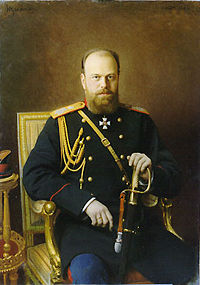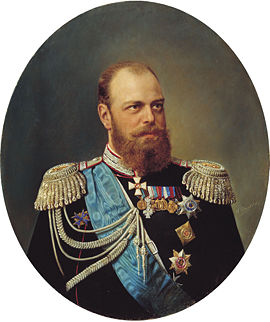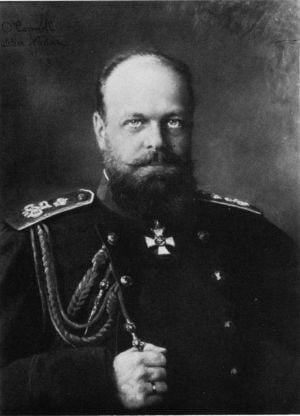Alexander III of Russia
| Emperor Alexander III | ||
|---|---|---|
| Emperor of Russia | ||

| ||
| Painting by Ivan Kramskoi | ||
| Reign | March 14, 1881âNovember 1, 1894 | |
| Born | March 10, 1845 | |
| Died | November 1 1894 | |
| Predecessor | Alexander II of Russia | |
| Successor | Nicholas II of Russia | |
| Consort | Maria Fyodorovna (Dagmar of Denmark) | |
| Issue | Nicholas II Grand Duke Alexander Alexandrovich Grand Duke George Alexandrovich Grand Duchess Xenia Alexandrovna Grand Duke Michael Alexandrovich Grand Duchess Olga Alexandrovna | |
| Royal House | House of Romanov | |
| Father | Alexander II of Russia | |
| Mother | Marie of Hesse and by Rhine | |
Alexander III (March 10, 1845 â November 1, 1894) reigned as Tsar (Emperor) of Russia from March 14, 1881 until his death in 1894. Alexander III reversed the constitutional reforms that his father, Alexander II, had enacted to further the modernization and democratization of Russia. By stopping and reversing these reforms, Alexander III sought to correct what he considered to be the too liberal tendencies of the previous reign. In his opinion, Russia was to be saved from anarchic disorders and revolutionary agitation not by parliamentary institutions and the so-called liberalism of Western Europe, but by the three principles of nationality, Eastern Orthodoxy, and autocracy.
Alexander III's regime emphasized central, imperial authority. By abolishing the new consultative role that his father had granted members of the educated class, he gave further impetus to the growing revolutionary movements that included anarchist elements as well as republicans, democrats, and socialists. While Alexander III actually took some satisfaction from looking like a Russian peasant, he was unprepared to grant them any political rights.
In hindsight, had Alexander III continued the course for reform set by his father Alexander II, Russia might have been gradually transformed into a democratic constitutional monarchy and a more equitable society. Instead, his autocratic rule helped pave the way for the Bolshevik revolutionaries who would one day murder his son, Tsar Nicholas II, and most of the family line.
Alexander III's autocratic policies set an example that later Soviet leaders would follow, notably Stalin, who was known as the âRed Tsar.â
Early Life
Alexander was born in St. Petersburg, the second son of Tsar Alexander II by his wife Marie of Hesse-Darmstadt. In disposition, he bore little resemblance to his soft-hearted, liberal father, and still less to his refined, philosophic, sentimental, chivalrous, yet cunning grand-uncle Alexander I of Russia, who coveted the title of "the first gentleman of Europe." Although an enthusiastic amateur musician and patron of the ballet, he was seen as lacking refinement and elegance. Indeed, he rather relished the idea of being of the same rough texture as the great majority of his subjects. His straightforward, abrupt manner savored sometimes of gruffness, while his direct, unadorned method of expressing himself harmonized well with his rough-hewn, immobile features and somewhat sluggish movements. His education was not such as to soften these peculiarities. He was also noted for his immense physical strength.
Perhaps an account from the memoirs of the artist Alexander Benois best describes an impression of Alexander III:
After a performance of the ballet 'Tsar Kandavl' at the Mariinsky Theatre, I first caught sight of the Emperor. I was struck by the size of the man, and although cumbersome and heavy, he was still a mighty figure. There was indeed something of the muzhik (Russian peasant) about him. The look of his bright eyes made quite an impression on me. As he passed where I was standing, he raised his head for a second, and to this day I can remember what I felt as our eyes met. It was a look as cold as steel, in which there was something threatening, even frightening, and it struck me like a blow. The Tsar's gaze! The look of a man who stood above all others, but who carried a monstrous burden and who every minute had to fear for his life and the lives of those closest to him. In later years I came into contact with the Emperor on several occasions, and I felt not the slightest bit timid. In more ordinary cases Tsar Alexander III could be at once kind, simple, and even almost...homely.
Rise to Power
During the first 20 years of his life, Alexander had little prospect of succeeding to the throne, because he had an elder brother, Nicholas, who seemed of robust constitution. Even when this elder brother first showed symptoms of delicate health, the notion that he might die young was never seriously entertained; Nicholas was betrothed to the charming princess Dagmar of Denmark. Under these circumstances, the greatest solicitude was devoted to the education of Nicholas as tsarevich, whereas Alexander received only the perfunctory and inadequate training of an ordinary grand-duke of that period, which did not go much beyond secondary instruction, practical acquaintance with French, English and German, and a certain amount of military drill.
Education
Alexander became heir apparent by the sudden death of his elder brother in 1865. It was then that he began to study the principles of law and administration under Konstantin Pobedonostsev, who was then a professor of civil law at Moscow State University and who later (in 1880) became chief procurator of the Holy Synod. Pobedonostsev awakened in his pupil very little love for abstract studies or prolonged intellectual exertion, but he influenced the character of Alexander's reign by instilling into the young man's mind the belief that zeal for Russian Orthodox thought was an essential factor of Russian patriotism and that this was to be specially cultivated by every right-minded tsar.
On his deathbed, Alexander's elder brother Nicholas is said to have expressed the wish that his affianced bride, Princess Dagmar of Denmark, should marry his successor. This wish was swiftly realized, when on November 9, 1866, Alexander wed the Princess of Denmark. The union proved a most happy one and remained unclouded to the end. Unlike that of his parents, there was no adultery in Alexander IIIâs marriage. During those years when he was heir-apparentâ1865 to 1881âAlexander did not play a prominent part in public affairs, but he allowed it to become known that he had certain ideas of his own which did not coincide with the principles of the existing government.
Foreign Relations
Alexander deprecated what he considered undue foreign influence in general, and German influence in particular, so the adoption of genuine national principles was off in all spheres of official activity, with a view to realizing his ideal of a homogeneous Russiaâhomogeneous in language, administration, and religion. With such ideas and aspirations he could hardly remain permanently in cordial agreement with his father, who, though a good patriot according to many, had strong German sympathies, often used the German language in his private relations, occasionally ridiculed the exaggerations and eccentricities of the Slavophiles, and based his foreign policy on the Prussian alliance.
The antagonism first appeared publicly during the Franco-Prussian War, when the tsar supported the cabinet of Berlin and the tsarevich did not conceal his sympathies with the French. It reappeared in an intermittent fashion during the years 1875â1879, when the Eastern question produced so much excitement in all ranks of Russian society. At first the tsarevich was more Slavophile than the government, but his phlegmatic nature preserved him from many of the exaggerations indulged in by others, and any of the prevalent popular illusions he may have imbibed were soon dispelled by personal observation in Bulgaria, where he commanded the left wing of the invading army.
The Bulgarians had been represented in St. Petersburg and Moscow not only as martyrs but also as saints, and very little personal experience sufficed to correct the error. Like most of his brother officers, Alexander III could not feel very great affection for the "little brothers," as the Bulgarians were then commonly called, and he was constrained to admit that the Turks were by no means so black as they had been painted. He did not, however, scandalize the believers by any public expression of his opinions, and did not indeed make himself conspicuous in any way during the campaign. Never consulted on political questions, he confined himself to his military duties and fulfilled them in a conscientious and unobtrusive manner. After many mistakes and disappointments, the army reached Constantinople and the Treaty of San Stefano was signed, but much that had been obtained by that important document had to be sacrificed at the Congress of Berlin. Prince Bismarck failed to do what was confidently expected of him.
In return for Russiaâs support, which had enabled Bismark to create the German empire, it was thought that he would help Russia to solve the Eastern question in accordance with Russiaâs own interests, but to the surprise and indignation of the cabinet of St. Petersburg, Bismark confined himself to acting the part of "honest broker" at the congress, and shortly afterwards he ostentatiously contracted an alliance with Austria for the express purpose of counteracting Russian designs in Eastern Europe. The tsarevich could point to these results as confirming the views he had expressed during the Franco-Prussian War, and he drew from them the practical conclusion that for Russia the best thing to do was to recover as quickly as possible from its temporary exhaustion and to prepare for future contingencies by a radical scheme of military and naval reorganization. In accordance with this conviction, he suggested that certain reforms should be introduced.
Anti-reforms
During the campaign in Bulgaria, Alexander III had found, by painful experience, that grave disorders and gross corruption existed in the military administration, and after his return to St. Petersburg he discovered that similar abuses existed in the naval department. For these abuses, several high-placed personagesâamong them two of the grand-dukesâwere believed to be responsible, and Alexander III called his father's attention to the subject. His representations were not favorably received. Alexander II had lost much of the reforming zeal which distinguished the first decade of his reign, and had no longer the energy required to undertake the task suggested to him. The consequence was that the relations between father and son became more strained. The latter must have felt that there would be no important reforms until he himself succeeded to the direction of affairs. That change was much nearer at hand than was commonly supposed. On March 13, 1881 Alexander II was assassinated by a band of Nihilists, Narodnaya Volya (People's Will), and the autocratic power passed to the hands of his son.
In the last years of his reign, Alexander II had been much exercised by the spread of Nihilist doctrines and the increasing number of anarchist conspiracies, and for some time he had hesitated between strengthening the hands of the executive and making concessions to the widespread political aspirations of the educated classes. Finally he decided in favor of the latter course, and on the very day of his death he signed an ukaz (decree) creating a number of consultative commissions which might have been easily transformed into an assembly of notables.
Following advice of his political mentor Konstantin Pobedonostsev, Alexander III determined to adopt a contrary policy. He at once cancelled the ukaz before it was published, and in the manifesto announcing his accession to the throne he let it be very clearly understood that he had no intention of limiting or weakening the autocratic power which he had inherited from his ancestors. Nor did he afterwards show any inclination to change his mind.
All the internal reforms which he initiated were intended to correct what he considered as the too liberal tendencies of the previous reign, so that he left behind him the reputation of a sovereign of the retrograde type. In his opinion Russia was to be saved from anarchical disorders and revolutionary agitation, not by the parliamentary institutions and so-called liberalism of Western Europe, but by the three principles which the elder generation of the Slavophils systematically recommendedânationality, Eastern Orthodoxy, and autocracy. His political ideal was a nation containing only one nationality, one language, one religion, and one form of administration, and he did his utmost to prepare for the realization of this ideal by imposing the Russian language and Russian schools on his German, Polish, and Finnish subjects, by fostering Eastern Orthodoxy at the expense of other confessions, by persecuting the Jews, and by destroying the remnants of German, Polish, and Swedish institutions in the outlying provinces. These policies were implemented by "May Laws" that banned Jews from rural areas and shtetls (small towns). This âRussificationâ policy would continue under the Soviet regime that emerged after Alexander IIIâs son's fall from power, especially during the leadership of Josef Stalin.
In the other provinces Alexander III sought to counteract what he considered the excessive liberalism of his father's reign. For this purpose he removed what little power had been exercised by the zemstvo, an elected local administration resembling the county and parish councils in England, and placed the autonomous administration of the peasant communes under the supervision of landed proprietors appointed by the government. At the same time he sought to strengthen and centralize the imperial administration, and to bring it more under his personal control.
In foreign affairs he was emphatically a man of peace, but not at all a partisan of the doctrine of peace at any price, and he followed the principle that the best means of averting war is to be well prepared for it. Though indignant at the conduct of Prince Bismarck towards Russia, he avoided an open rupture with Germany, and even revived for a time the Three Emperors' Alliance.
It was only in the last years of his reign, when Mikhail Katkov had acquired a certain influence over him that he adopted a more hostile attitude toward the cabinet of Berlin, and even then he confined himself to keeping a large quantity of troops near the German frontier and established cordial relations with France. With regard to Bulgaria he exercised similar self-control. The efforts of Prince Alexander and afterwards of Stamboloff to destroy Russian influence in the principality excited Alexander IIIâs indignation, but he persistently vetoed all proposals to intervene by force of arms.
In 1887 the Peopleâs Will once again planned to murder the tsar. Among the conspirators captured was Aleksandr Ulyanov. Ulyanov was sentenced to death and hanged on May 5, 1887. Alexander Ulyanov was the brother of Vladimir Ilyich Ulyanov, who would later take the pseudonym Vladimir Lenin.
In Central Asian affairs he followed the traditional policy of gradually extending Russian domination without provoking a conflict with the United Kingdom, and he never allowed the bellicose partisans of a forward policy to get out of hand. As a whole, his reign cannot be regarded as one of the eventful periods of Russian history, but it must be admitted that under his hard, unsympathetic rule the country made considerable progress. He died in the Livadia Palace on November 1, 1894 and was buried at the Peter and Paul Fortress in St. Petersburg. Alexander III was succeeded by his eldest son Nicholas II of Russia.
A memorial to Tsar Alexander III is located in the city of Irkutsk at the embankment of the Angara River.
Issue
Alexander III had six children of his marriage with Princess Dagmar of Denmark, later known as Marie Feodorovna.
| Name | Birth | Death | Notes |
|---|---|---|---|
| Tsar Nicholas II | May 6, 1868 | July 17, 1918 | married 1894, Princess Alix of Hesse and by Rhine; had issue |
| Grand Duke Alexander Alexandrovich | June 7, 1869 | May 2, 1870 | |
| Grand Duke George Alexandrovich | May 6, 1871 | August 9 1899 | |
| Grand Duchess Xenia Alexandrovna | April 6, 1875 | April 20, 1960 | married 1894, Grand Duke Alexander Mikhailovich Romanov; had issue |
| Grand Duke Michael Alexandrovich | November 22, 1878 | June 12, 1918 | married 1912, Natalia, Princess Brassova; had issue |
| Grand Duchess Olga Alexandrovna | June 13, 1882 | November 24, 1960 | married Peter Friedrich Georg, Duke of Oldenburg |
| Preceded by: Alexander II |
Emperor of Russia March 14, 1881âNovember 1, 1894 |
Succeeded by: Nicholas II |
ReferencesISBN links support NWE through referral fees
- Naimark, Norman M. Terrorists and Social Democrats: The Russian Revolutionary Movement Under Alexander III. Cambridge, MA: Harvard University. 1983. ISBN 0674874641
- Whelan, Hedi W. Alexander III and the State Council: Bureaucracy and Counter-Reform in Late Imperial Russia. Piscataway, NJ: Rutgers University. 1982. ISBN 0813509424
- Zaionchkovsky, Peter A. The Russian Autocracy Under Alexander III. FL: Academic Internatinal. 1993. ISBN 087569067X
- This article uses material from the 1911 edition of the EncyclopĂŠdia Britannica which is in the public domain.
External links
All links retrieved July 18, 2023.
- Find a Grave. Alexander III Alexandrovich Romanov.
- Malsom, Scott. Alexander III.
Credits
New World Encyclopedia writers and editors rewrote and completed the Wikipedia article in accordance with New World Encyclopedia standards. This article abides by terms of the Creative Commons CC-by-sa 3.0 License (CC-by-sa), which may be used and disseminated with proper attribution. Credit is due under the terms of this license that can reference both the New World Encyclopedia contributors and the selfless volunteer contributors of the Wikimedia Foundation. To cite this article click here for a list of acceptable citing formats.The history of earlier contributions by wikipedians is accessible to researchers here:
The history of this article since it was imported to New World Encyclopedia:
Note: Some restrictions may apply to use of individual images which are separately licensed.

